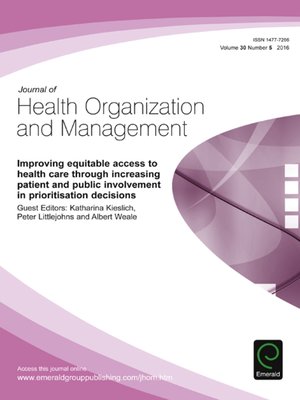Journal of Health Organization and Management, Volume 30, Number 5
ebook ∣ Improving equitable access to health care through increasing patient and public involvement in prioritisation decisions · Journal of Health Organization and Management
By Helen Dickinson

Sign up to save your library
With an OverDrive account, you can save your favorite libraries for at-a-glance information about availability. Find out more about OverDrive accounts.
Find this title in Libby, the library reading app by OverDrive.



Search for a digital library with this title
Title found at these libraries:
| Loading... |
Universal health care is now a common aspiration across the world. In Asia countries like South Korea and Thailand have laid a path to universal coverage, while China seeks to ascertain how it can meet the health care needs of a population of more than 1.3 billion people. In Latin America, post-authoritarian constitutions wrestle with the problem of how feasibly to achieve the goal of ensuring the right to health contained in their democratic constitutions. In Africa, decision makers seek to cope with extending health care to poor rural communities and excluded societal groups. In Europe, Australasia and Canada the demands of ageing populations and high cost pharmaceuticals challenge policy makers to ensure cost-effective delivery of care. Even in the United States, for so long the outlier among high income countries in its neglect of universal health care, decision makers are working out the implications of increasing the number of citizens with health insurance through the Affordable Care Act.Priority setting is present in all of these cases, whether explicitly in institutions like health technology assessment agencies, or implicitly in the non-decisions through which choices are made about which interventions receive priority, and in which priorities exist in the privileges of the status quo or the hauling and pulling of interest groups, professional bodies and political partisans. Fairness in resource allocation will often require that existing allocations of resources are reviewed and in some instances reformed. It always requires scrutiny of the processes and outcomes associated with resource allocation to avoid arbitrary, bias, or inequitable decisions. But how is this to be done?The purpose of this ebook is to bring together the experience of different countries in relation to these issues. The papers originate in a week-long workshop held at the Brocher Foundation between 9 and 13 November 2015, which brought together participants from 13 countries to compare and contrast the role of public participation and priority setting. Country profiles compiled according to a standard protocol were presented, and analytical questions about public participation – its meaning, role and effectiveness – discussed. The result has been a collective achievement built upon the collaborative efforts of all those present at the workshop. We believe that the results challenge easy over-generalizations from too limited a range of cases in a very small number of largely high income countries.






